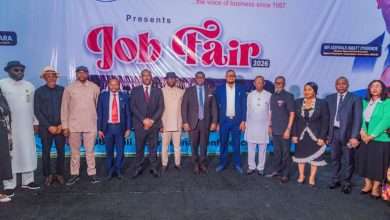
Activists and civil society campaigners have criticised the order given by Nigeria’s Minister of Transport, Rotimi Amaechi, to construction firm CCECC Nigeria Limited to award contracts to local companies he hand-picked.
The campaigners, who spoke in separate interviews with PREMIUM TIMES, called on relevant regulatory agencies to look into the matter and address the concerns raised in the procurement process.
PREMIUM TIMES reported how Mr Amaechi gave the directive to the Chinese construction company in a letter exclusively obtained by this newspaper, dated October 14, 2021.
The letter was signed on behalf of Mr Amaechi by J.A Yusuf, Director of Rail Transport Services at the transportation ministry.
The contracts are in connection with the Nigerian Railway Modernisation Project covering the Lagos-Kano and Kaduna-Kano sections.
China Civil Engineering Construction Corporation (CCECC)
Hand-picked
According to the letter, the minister hand-picked the companies in accordance with what Mr Yusuf described as “Local Content Policy of the Nigerian Government”.
Titled ‘Local Content Policy on Construction Materials and Equipment’, the ministry claimed it received Expression of Interest from the various companies it listed in connection with the railway project. The ministry further directed the construction company to invite the hand-picked companies listed in the letter for contractual engagement.
Aside from submitting the list of hand-picked companies to the construction firm, Mr Amaechi, through the Ministry of Transportation, attached to the letter a quotation showing the expense of purchasing materials in the local market.
The quotation also listed all the companies and the specification and unit of materials they are expected to supply to the construction company.
In addition, the quotation detailed the quantity of materials each company is expected to supply, as well as the ‘market prices’ of the materials. Quick checks conducted on the status of the companies showed that they are domiciled mostly in Kano, Kaduna and Port Harcourt.
Insiders at CCECC expressed worry over the controversial letter, adding that it is in contravention of the nation’s procurement laws. A source told this newspaper that CCECC management was disturbed by the development, and found it quite difficult to deal with.
For months, PREMIUM TIMES searched for the ‘Local Content Policy on Construction Materials and Equipment’ referenced by Mr Amaechi through the transportation ministry in its letter to CCECC, but this newspaper could not find any such document.
Officials at the transport ministry declined to speak on the issue when contacted, and they failed to acknowledge if there was any such policy document.
But government sources told PREMIUM TIMES that no policy or executive order could have given Mr Amaechi the express authorisation to unilaterally hand-pick contractors for a private company engaged by the government.
Activists Fume
In an interview with PREMIUM TIMES, the deputy chairman of the Joint Action Front, Achike Chude, condemned incessant cases of violation of procurement law in Nigeria.
“The issue of violation of procurement law fits within the greater context of corruption going on in the country,” Mr Achike said.
“The (procurement) laws and policies were put in place to ensure transparency and accountability and to also avoid some sort of discrimination in procurement. It also ensures that there is quality and not just quantity and at the end of the day, and that Nigeria gets value for every naira spent. And so it was supposed to eliminate corruption in procurement.
“That’s why we have the procurement laws and the fiscal responsibility bill. These two were supposed to work hand-in-hand as instruments to curb corruption with regards to procurement. But unfortunately that has been observed in the breach, regardless of these policies.”
Mr Achike argued that there is a systemic breakdown in the country, not just in the public place but also in the private space.
“The reason why it is being violated is because everybody that matters in the scheme of things, from the level of MDAs and even anti-corruption agencies, is involved in the process. When there is a violation; who does something about it?
“There are deliberate obstacles put in the way to make it difficult for people to have access to this information and when they have access, and the anti-corruption agencies get to investigate, you realize that some of these investigations are corruptly induced. So it is not something within procurement issues but a systemic chain. It’s sad.”
On his part, the chairman of the Human and Environmental Development Agenda (HEDA), Olanrewaju Suraju, described reports of Mr Amaechi’s conduct as “embarrassing”, calling for immediate sanction by appropriate authorities.
“Reports of abuse of office, undermining of due process and cronyism against Mr. Rotimi Amaechi on award of contract and overbearing influence over Agencies under his ministry suggest he still relishes in his alpha and omega power as a governor in Rivers State,” he said.
“It is embarrassing reading his penchant for shoddy management of affairs as a minister. The president, in his usual practice, has failed to respond to all the scandalous revelations while the Parliamentarians are too complacent or compromised to raise questions.
“It is important that Mr. Amaechi is charged by stakeholders to come clean on all the allegations and appropriate sanctions applied where infractions are established.”
Mr Amaechi has a record of violating the nation’s procurement laws. At various times, he has got himself mired in arbitrary conduct in his handling of procurement processes.
Last year, a PREMIUM TIMES’ investigation showed how President Muhammadu Buhari and Mr Amaechi approved a huge national security-sensitive maritime contract to a medical company in a process the Bureau of Public Procurement (BPP) said was “embarrassing” and illegal.
In a number of other contractual agreements involving the Nigerian Ports Authority, Mr. Amaechi has been found to have recklessly violated extant rules.






